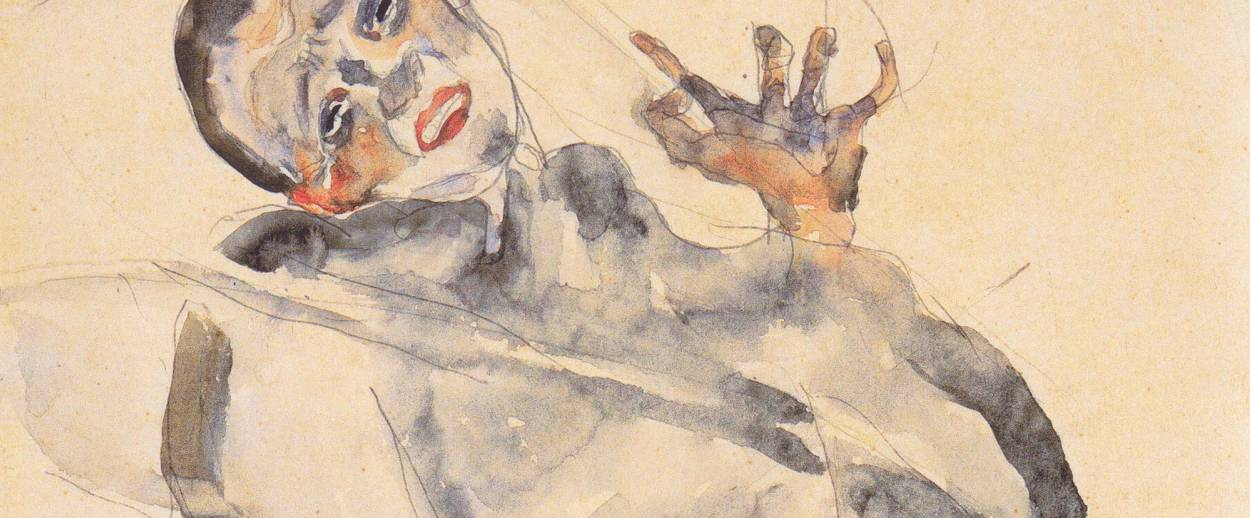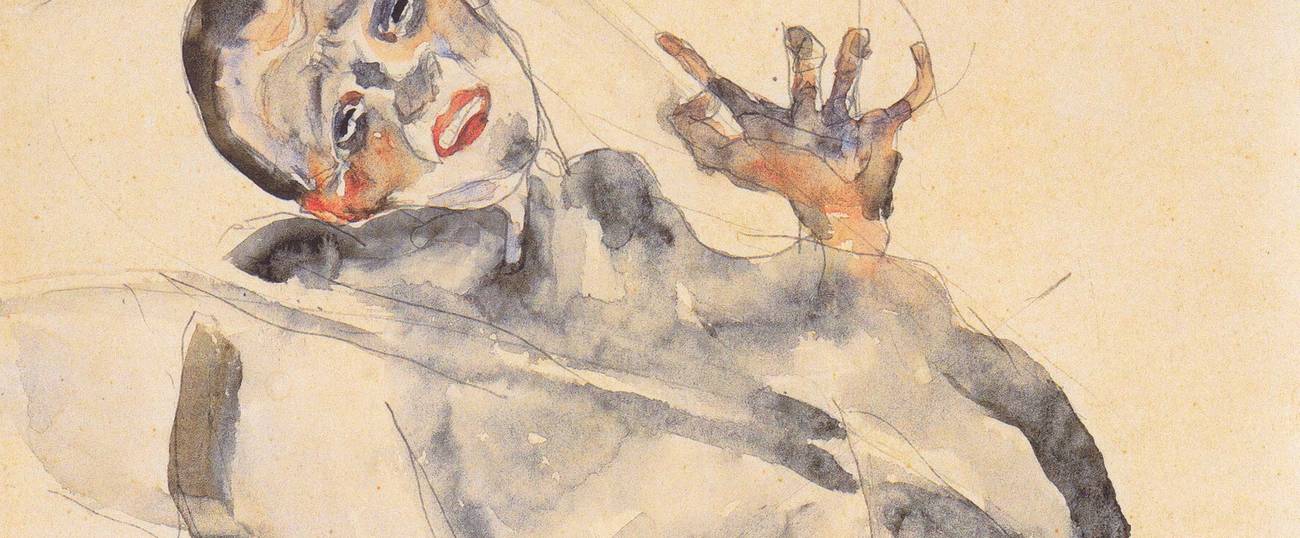A Tale of Sadomasochism and Coffee
The café as ‘safe space’ in interwar Vienna, in David Fogel’s Hebrew classic, ‘Married Life’




A romantic might lament that no American café today resembles the one in interwar Vienna where the characters of David Fogel’s novel Married Life gather. But after you read it, you’ll thank God for that.
In this deeply disturbing novel, first published in Hebrew in 1929, a group of young Jewish friends meet at a café every evening, which ought to make it feel like an American bar scene. But it’s a café, not a bar, and in that nontrivial difference lies the fundamental problem of European Jewish existence. Bars sell alcohol, which means their clientele wants to lose its inhibitions; the room’s emotional undercurrent is desire or despair. Cafés sell coffee, which means their clientele wants to maintain its inhibitions, even refine them; the room’s undercurrent is anxiety, everyone’s favorite Jewish psychological disorder. Without that anxiety, Fogel’s story of a Jewish writer’s sadomasochistic marriage to a Viennese baroness would be utterly implausible. Instead, it’s chillingly realistic, and a powerful metaphor for the relationship between Jews and Europe itself. The fact that this is a novel by one of the last European Hebrew writers hardly feels like a coincidence. Its mood, fueled by perverse abuse and nighttime caffeine, is one of insomnia and impending doom.
David Fogel (sometimes called “Vogel” in English, as he is in the book’s 1988 English translation) was an extraordinary writer; that he wrote exclusively in Hebrew is beyond extraordinary. People have written in Hebrew every day for the last 3,000 years, but for most of that time, no one spoke it. Writing in Hebrew was akin to writing in Latin, useful only for religious tracts and high-brow poetry; the language had neither the colloquialisms nor even the grammar for things like pillow talk. By the early 1900s, Hebrew was still so severely inadequate for modern fiction that the novelist Uri Nissan Gnessin had to invent the past continuous tense. The earliest modern Hebrew writers leaned so heavily on biblical and rabbinic language that their works sometimes collapsed beneath the liturgical weight. But Fogel’s life mission was to supply Hebrew with contemporary literature of the highest caliber.
Born in a Russian-Polish shtetl in 1891, Fogel followed other Jewish writers of the era out of religious life and into cosmopolitan cities, which in his case included Vienna, where he was imprisoned as an enemy alien during World War I, and Paris, where he was imprisoned as an enemy alien during World War II. In between, he emigrated to Palestine, but Fogel, who wrote in Hebrew even in his private diary and ultimately became a canonical Hebrew poet, could not stay away from Europe, and he returned after only a year. By 1944 he was dead at Auschwitz. But enough about that. Coffee, anyone?
Married Life’s protagonist, Rudolf Gurdweill, is an aspiring writer from the provinces struggling to make it in Vienna. His friends are Jews like him: ambitious professionals who have bet the farm on acceptance into European society—except for Lotte Bondheim, the only native Viennese among them, whose sarcastic despair comes from her awareness that they will never succeed. One evening in the café, Gurdweill notices a towering Brunhilde of a woman at another table. His friends find her unremarkable, but Gurdweill, with better intuition than he yet knows, insists she has “something of the old Viennese tradition” about her and approaches her on a dare. When his initial pickup lines fail, he tries another, more truthful and more ominous: “Sometimes you meet someone for the first time and you feel instinctively that he is the source of the sorrow without which you cannot exist.” The woman introduces herself as Baroness Thea von Takow and responds, “About needing sorrow to go on living—I must beg to differ. … I, at least, live only by and for happiness.” As they leave the café together, with the diminutive Gurdweill literally looking up to the tall baroness, he feels “a wonderfully pleasant sensation together with a terrifying uneasiness.” On their first date, Thea asks Gurdweill to marry her and even insists on converting to Judaism for a Jewish wedding to boot. Stunned by unexpected acceptance, Gurdweill says yes—and embarks on the long road to ruin.
The baroness turns out to be well beyond your average hedonist. She is a dyed-in-the-wool sadist, a sexual predator who sleeps with a different man every week of their marriage, bites Gurdweill during their rare sexual unions, shreds Gurdweill’s manuscripts, and treats Gurdweill as her slave, ordering him to do her bidding, hitting him when he doesn’t instantly comply with her whims, and threatening to strangle him in his sleep. (Nor, we learn, is she particularly unique; her brother cheerfully tells Gurdweill about his hobby of strangling family pets.) But Gurdweill, too, is well beyond your average melancholy poet. He is a masochist, one who repeatedly burned himself and stuck himself with needles as a child without knowing why. As an adult, he relentlessly rationalizes Thea’s abuse in order to remain with her, because it is exactly her cruelty that makes him feel worthy, the crumbs of her attention becoming his great prize. (One often wishes that Gurdweill would look up Freud in the Viennese phonebook, but that would require exactly the agency that Gurdweill lacks.) It’s a match made in hell, and the reader’s hell is witnessing Gurdweill’s endless arguments with himself about why it’s all perfectly fine. When Thea becomes pregnant—with, of course, another man’s child—Gurdweill convinces himself that everything will change. And everything does, becoming far worse than he or the reader could have ever imagined.
If this were a contemporary American novel, it would be a story about a psychopath.
Abusive marriages thrive on secrecy, and a conventional story about one would capture that private terror of hiding the truth. But what magnifies the horror here is that there is absolutely nothing private about it. Thea parades her abuse before all of Vienna, even announcing to Gurdweill’s friends that “I can do what I like with him. … I hit him as often as I want, for my own private pleasure!” If this were a contemporary American novel, it would be a story about a psychopath. But Fogel makes it painfully clear that the dynamic between Gurdweill and the baroness is not exceptional. Instead, it is mirrored in every experience this novel’s Jewish characters have. When Gurdweill and his friends visit an unfamiliar café, they are seated beside the “Aryan Nature Lovers Meeting, Neubau Branch” and overhear the group’s anti-Semitic speeches—but they find the atmosphere perversely appealing; Lotte even tells Gurdweill, “You sit in a place like that and suddenly you realize the whole world with all its complications is slipping through your fingers. … It’s an extraordinary feeling, I’m telling you. And at that moment you’re not the least sorry for losing the world.” When they ride the city’s tram, a drunk harasses them with anti-Semitic slurs—but they barely respond, leaving Gurdweill feeling “ashamed, as if he had been the cause of the quarrel.” In one apparent tangent, Gurdweill is a bystander to a Jewish teenager’s public suicide; in another, Gurdweill comforts a young stranger after a public panic attack; later, when one of his friends faces a far worse mental crisis, Gurdweill lacks the will even to respond when she essentially begs him to rescue her. Vienna, we slowly realize, isn’t the backdrop for Gurdweill’s marriage. Gurdweill’s marriage is the backdrop for Vienna, for Austria, for Europe itself, full of Jews who will abase themselves without limit for any crumb of social acceptance, and full of non-Jews who gleefully know it.
Fogel’s free and indirect style—brand new in Hebrew at the time—allows the boundaries between Gurdweill’s thoughts and his reality to blur, achieving nuances of private emotion that were previously inaccessible in the language. Robert Alter points out the apparent naturalness of Fogel’s language, including its dearth of Jewish textual allusions and his creation of new and necessary expressions that never before existed in Hebrew, like the phrase “ha-ani sheli” (literally “my I”) to indicate one’s selfhood as distinct from one’s consciousness. Terms like this never existed before in Hebrew—not just because the language was underdeveloped but because Jewish culture, like most ancient cultures, always favored the communal over the individual. Historically, no one on Planet Hebrew ever cared about anyone’s private angst, because the source of that angst was assumed to be something public: a product of the covenantal dynamic between the people and God. What’s most horrifying about Married Life, and most unsettling to the modern reader, is how, 3,000 years later, that assumption about collective destiny turns out to be weirdly true. Gurdweill’s anxiety, and his fate, actually aren’t his alone; his “I,” in the most cosmic sense, isn’t personal at all. What’s even more horrifying is that the same can be said of the fate of his creator.
Married Life is far from a perfect book. It could stand to lose at least 100 pages, and its recurring situations are exasperating. But one senses that this is part of the point: The novel’s redundant language encourages a kind of learned helplessness as Gurdweill’s situation becomes increasingly unbearable. The book’s ending—a twist on the very last page—is satisfying only as a sick fantasy, one that the reader wishes had been an option for the murdered Fogel himself. But what makes Married Life worth reading today is the power of what it accomplishes in Hebrew, not merely linguistically but psychologically, in the anxious honesty of the café, a place where no one is writing novels or meeting colleagues or even dating; as Gurdweill’s friend puts it, “in a café, inactivity is the rule.” The café is what Gurdweill’s peers today might call a “safe space,” where Jews can express their anxieties without the consequences of showing weakness. Thea’s violation of that space reveals just how desperately they needed it.
Dara Horn is the award-winning author of five novels and the essay collection People Love Dead Jews.